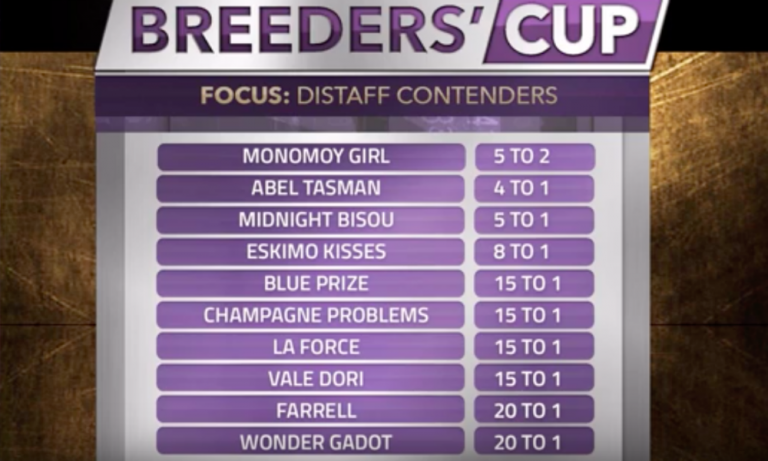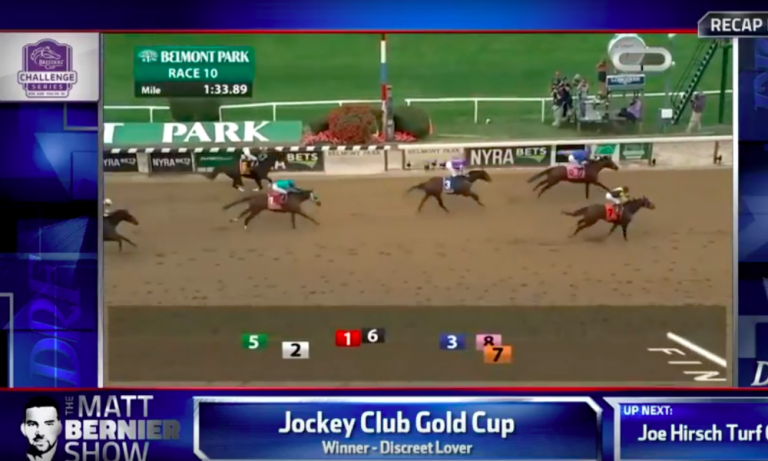ELMONT, N.Y. – Millionaire stablemates Disco Partner and Pure Sensation will certainly attract most of the mutuel attention in Saturday’s $150,000 Belmont Turf Sprint Invitational, but the six-furlong race may not be a two-horse affair.
Proforma, an improving 4-year-old gelding, enters the Belmont Turf Sprint off a head victory under Joe Bravo in the Grade 3 Kentucky Downs Turf Sprint, a career-best performance.
“I think he certainly fits off his last race,” trainer Michael Stidham said Thursday. “The horse is definitely on the improve and Bravo has gotten to know him real well. I think he’s in there with a big shot.”
Stidham said it took him awhile to determine that turf was Proforma’s preferred surface. He finished third in the Wolf Hill Stakes at Monmouth on turf on July 29, but Stidham concluded the 5 1/2 furlongs was too short for him.
“They sprinted away from him early and he was the only horse to make up ground in the end,” Stidham said. “Six to 6 1/2 furlongs really suits him well.”
Disco Partner won the Belmont Turf Sprint last year and Pure Sensation won the inaugural running in 2016. The two horses – owned by and bred by Patricia and Frank Generazio and trained by Christophe Clement – have combined to win 20 of 54 starts with 9 seconds and 10 thirds.
Disco Partner is at less than his best on ground less than firm, and the Belmont turf has not been firm all meet. He finished third in the Grade 3 Troy on soft turf at Saratoga on Aug. 5.
“You could see it,” Clement said. “He’s traveling very well on the bridle, and when he asked him he spins his wheels. He tried hard and he came back in good shape.”
Pure Sensation, who is 2 for 4 at Belmont, is a freak over the turf course at Parx Racing, where he is 5 for 6 including a victory in the Grade 3 Turf Monster over Vision Perfect and Rainbow Heir in his most recent start.
“Another where you could physically see him trying,” Clement said. “He was more or less beaten coming out of the turn, and he tried again and he won. I guess he must love that place.”
With regular rider Kendrick Carmouche out with an injury, Jose Ortiz has the call on Pure Sensation, who breaks from post 5.
Pocket Change, Blind Ambition, Simon Bar Sinister, and Maniacal complete the seven-horse field.
KEY CONTENDERS
Proforma, by Munnings
Last 3 Beyers: 94-91-87
◗ Has fired two bullet workouts over the synthetic surface at Fair Hill since his last race.
Pure Sensation, by Zensational
Last 3 Beyers: 98-88-99
◗ Game effort winning the Turf Monster last out and has speed to be a factor from outset.
◗ May have to deal with some pressure from Pocket Change.
Disco Partner, by Disco Rico
Last 3 Beyers: 92-97-103
◗ The ultimate horse for course with eight wins from 13 starts here.
◗ Could be compromised if the turf is good to yielding.
This story originally appeared on DRF.com.
Visit DRF.com for additional news, notes, wagering information, and more.






